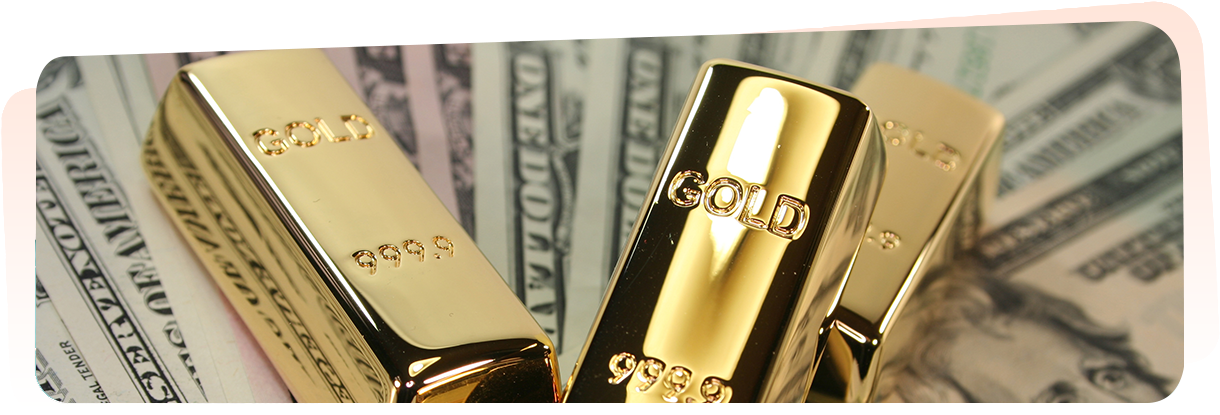Self-Directed IRA PRECIOUS METALS
Gold and other precious metals are often seen as hedges against inflation and economic downturn. Since precious metals have intrinsic value and accepted commodity value, they can offer a strong hedge against a weak dollar or serve as a bullish asset for the long term.
Historically, precious metals served as currency but are now regarded primarily as an investment and industrial commodity. For example, gold, silver, platinum, and palladium each have their own ISO 4217 currency code.
Unfortunately, many retirement plans restrict investor access to precious metals–aside from metal stocks–despite their relative long-term stability.
Thankfully, a self-directed IRA offers investors the ability to purchase and hold gold and other precious metals directly, granted they follow proper rules.
Explore the benefits of a precious metals IRA and how to start investing in precious metals with your SDIRA.
What is a Precious Metals IRA?
A precious metals IRA is an IRA focused on precious metal investments, such as gold, silver, and other metals.
Precious metal IRAs are often run by a custodian well-versed in the rules and regulations governing precious metal investments.
While these IRAs are sometimes referred to as “gold IRAs,” gold is not the only precious metal that can be purchased through this investment vehicle.
What Precious Metals Can You Purchase in an SDIRA?
If you’re interested in investing in a precious metals SDIRA, you are allowed to invest in four types of metals, including:
- Gold
- Silver
- Platinum
- Palladium
However, SDIRA investors are prohibited from investing in collectibles, but certain types of coins can be purchased through an SDIRA. For instance, American Gold and Silver Eagle coins can be purchased through an SDIRA because they are made of precious metals.
Special Rules Governing Precious Metal IRAs
As is the case with any investment vehicle, some special rules govern the purchase of precious metals through an SDIRA.
As we’ve already established, only four types of metals can be purchased through an SDIRA. There are also purity requirements, such that:
- Gold must be 99.5% pure
- Silver must be 99.9% pure
- Platinum and palladium must be 99.95% pure.
Bars and round coins must be produced by a certified or accredited refiner, manufacturer, or assayer. And proof coins must be in their original packaging, in excellent condition, and with a certificate of authenticity.
Finally, bullion bars must weigh the exact amount shown on their packages.
How Do You Open a Precious Metals SDIRA?
To open a precious metals SDIRA, you must choose a custodian to handle your account. Even though precious metal IRAs are a form of self-directed investing, the law requires you to work with a custodian who will manage the account’s paperwork and other legal aspects.
You will then work with your custodian to choose a precious metals dealer. Choosing a reputable dealer familiar with the requirements for precious metals investments is important. Once you’ve chosen the dealer, you can purchase and add precious metals to your investment portfolio.
The IRS encourages investors to keep their precious metals in a depository. While there isn’t a law that requires this, it’s a good idea not to have your precious metals lying around your home for safekeeping.
Are Precious Metals a Good Investment for IRA Holders?
Precious metals are a great investment vehicle for IRA holders. Gold, silver, and other precious metals do not depreciate in value, which means your assets will be worth more when you’re ready to liquidate them.
Additionally, precious metals like gold have historically performed well during inflationary storms, making them a great hedge.
Ultimately, adding precious metals to your portfolio adds diversification and can be a high-growth long-term investment.
How Much Precious Metals Should My IRA Hold?
The number of precious metals that you choose to hold in your SDIRA is ultimately up to you. One of the biggest benefits of your SDIRA is that you get to diversify at your own rate. While you may not want to only invest in precious metals, adding them to your portfolio is a great idea.
PLEASE NOTE: As a client of Horizon Trust, Inc., or any other self-directed custodian, it is completely your responsibility to investigate each and every investment that you make. Horizon Trust cannot and does not provide any protection from a poor or improper investment. Make sure you know what you are investing in, with whom you are investing, and what investments may constitute a violation of IRS code with regard to Individual Retirement Accounts.
